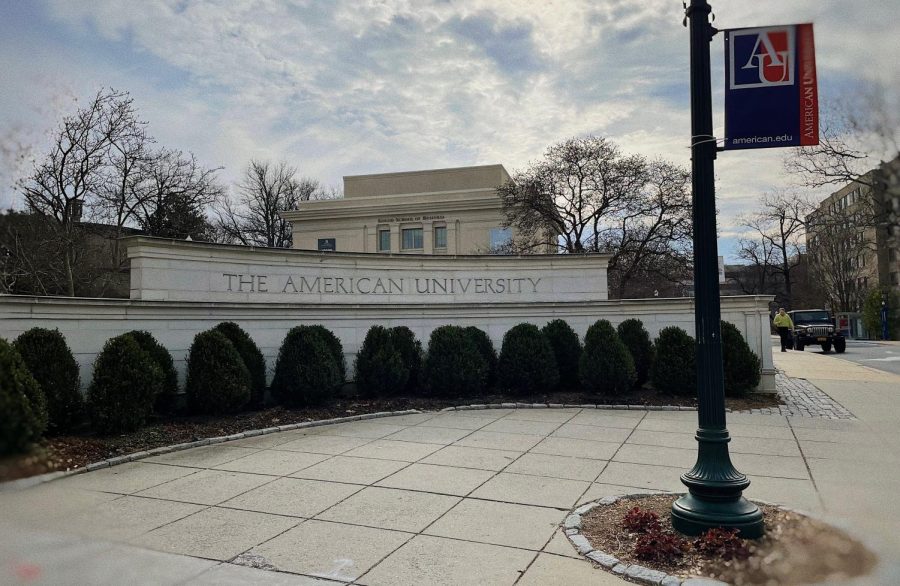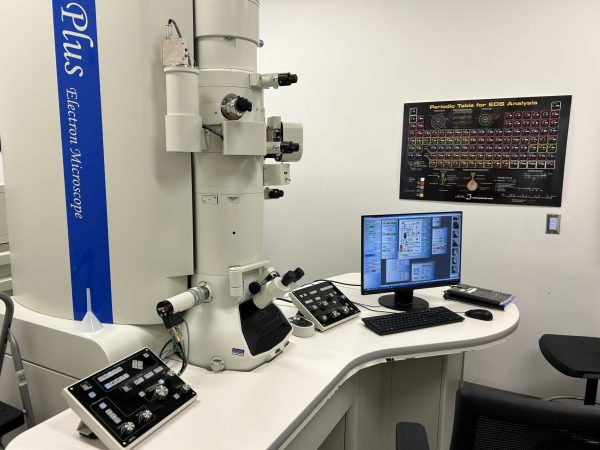The Rise of Abolishment
A look back at American University Student Government’s activities throughout the fall 2022 semester.
American University Student Government began legislating this semester after electing a new speaker on Jan. 29. Many issues from last semester — where officials resigned and advocates to abolish the legislative body were elected — may impact the government’s 18th senate.
The undergraduate population is represented by the student-run organization American University Student Government or AUSG. The organization is responsible for “furthering the interests and promoting the welfare of all students at AU,” according to its website’s mission statement.
With over 8,000 undergraduates, according to the university’s 2021 academic profile, the Princeton Review ranked AU fifth in the nation for having the most active college student government.
Last semester, AUSG held a public town hall meeting featuring the organization’s executive branch members. Students had the opportunity to express their concerns to AUSG. Each executive branch member detailed what they’ve been working on over this semester ranging from advocacy, dining, budget management and social media restructuring.
A common complaint during the town hall meeting was the lack of transparency and understanding of AUSG’s system.
Noah Gocial, the class of 2025 Senator and Chair of the Committee for Accountability, Transparency and Accessibility, said students should take the initiative.
“If people want to know what happened, reach out to anybody,” Gocial said. “There’s nobody, in my opinion, who is just going to say ‘I can’t tell you this.’”
AUSG’s current website contains several pieces of outdated info, such as the senate legislation tracker, which was last updated on April 4, 2022. Former Secretary and current Speaker of the Senate Aly McCormick said at a town hall meeting that this is a work in progress as it makes it difficult to track their progress. The website has begun to receive updates since the meeting, such as the addition of its Center for Assistance with Services and Equity program.
There are no direct links to the spring 2023 semester’s activities, but Gocial said that meeting recordings can only be found on their Facebook page.
“There are very interesting things being said [at the meetings,] and you can go to the Facebook page which is going to be, because I could not find it for the life of me,” Gocial said.
According to their website, AUSG is divided into three branches: the executive, legislative and judicial. Like the U.S. government, each branch holds power over the others to create a system of checks and balances. Both the executive and legislative branches are elected by popular vote. The judicial branch comprises five students: two appointed by the president, two appointed by the speaker of the senate and one appointed by both the president and speaker of the senate.
Steven Taylor, a professor at the School of Public Affairs, said the judicial branch should be independent of the other two branches.
“There’s partnership bias and then there’s friendships, but when you get to the level of student government at a school, that’s much smaller and much more of an intimate setting than the national government,” Taylor said.
AUSG President Chyna Brodie said in the town hall that voting is low, and there is a consistent pattern of few upperclassmen running for office. Comptroller Logan Galimi said that, while this is an issue, there isn’t much they can do about it beyond increasing transparency and letting people know the good work AUSG can do.
Brodie’s sentiments are shared by some of her colleagues. Taylor also said voter turnout is a major issue.
“There’s some kind of issue in legitimacy because people don’t feel that the body [AUSG] is representative,” Taylor said. “They haven’t been voted on by a large number of people, but the point is a lot of people that complain about their own unrepresentativeness are people who themselves didn’t vote. It’s a matter of trying to increase the turnout, and that’s not an easy thing to do.”
Gocial said he believes in a similar concept that his colleagues mentioned.
“When students don’t trust us, that shows the administration that we’re not effective, which lowers our ability to do anything,” Gocial said.
Throughout the fall 2022 semester, the AUSG structure was under review by The Center for Student Involvement, or CSI.
“Last spring, as part of a larger student involvement assessment, CSI initiated a review of all student groups,” said Jasmine Pelaez, Internal Communications Manager for the Office of Communication and Marketing, “As a direct result, Student Media, AU Student Government and Programming working groups were created.”
CSI’s “student involvement assessment” led to several changes, including how the organization receives its funding. Previously, according to their website, a committee of students would allocate money to individual clubs from the $88.50 activity fee every student pays with tuition.
At the end of the fall 2022 semester, CSI made a $100,000 allocation to AUSG plus an additional $45,000 for various staff stipends, according to an AUSG Instagram post. Under the new structure, AUSG no longer funds various student-run programs such as the Student Union Board, Students for Change Initiative and Kennedy Political Union, according to the AUSG post.
Pelaez said, like previous semesters, these club allocations still come from the student activity fee. Pelaez sent a document to AWOL that said the student activity fee was created to support student clubs.
“The Board of Trustees approves and encourages strong student-sponsored programs that contribute significantly to the intellectual and social development of the student body,” according to the Mandatory Student Activity Fee Administration document.
At the town hall meeting, Galimi said that AUSG provides an opportunity for students to learn valuable skills and network.
Despite reform efforts to help restructure AUSG, some AU students would prefer the student government organization to dissolve.
On Oct. 10, Junior Chandler Eby announced his campaign for senator on Instagram, saying that his main goal is to completely abolish AUSG.
“I get that question a lot, ‘Do you just want to make it better? Get rid of elitism?’ No, it goes away entirely and is completely abolished,” Eby said.
Eby announced his blueprint to abolish AUSG through an Instagram post on Nov. 13.
With AUSG’s collective $145,000 allocations, Eby said he wants to redistribute those funds to individual clubs and club councils.
During the fall semester, Eby went on the ballot as the sole candidate for representing the class of 2024 in the senate on Oct. 11, and there were few other upperclassmen involved in the organization.
“I think that’s a very clear indicator about how the more you’ve been here, the more you realize how ridiculous AUSG is and you don’t want to deal with it,” Eby said.
Eby did not run for senator for the spring semester, according to Gocial. However, Eby said that the preferable option would be to have students vote on the issue in the upcoming spring semester ballot.
“I think having students vote on it is a really important step,” Eby said.
Outside of the internal issues within AUSG, the student government organization has passed legislation about broader issues on campus.
Later in the semester, AUSG released a statement of solidarity calling out Burwell to “take immediate action,” a week after the sexual assault incident in Leonard Hall. AUSG said they supported the walkout that took place on Nov. 10.
On Nov. 6, the senate held a meeting announcing their establishment of a Public Safety Committee that would focus on access to resources and specific safety concerns, such as the path between Katzen and Nebraska Hall being too dark at night. On December 28th, the full report was released.
The semester drew to a close with a few pieces of legislation to consider before students left for winter break.
On Dec. 4, 2022, the senate voted on several pieces of legislation, including a bill that would remove feminine products from men’s restrooms. A separate bill encourages all professors to acknowledge Young Earth Creationism, which is the belief that the world was created by a supernatural entity instead of the scientific Big Bang Theory.
The feminine products bill, known as Resolution 17032, did not pass. However, the creationism bill, Resolution 17031, was sent to the Faculty Senate for a vote. At the end of the 17th senate term, only four senators decided to stay in the senate.
In response to all the complaints AUSG has received, Brodie gave a speech at the Dec. 11 senate meeting addressing how AUSG is perceived by students.
“This is not a good look, y’all, this is a horrendous look,” Brodie said. “We need to be better. Students are depending on us, and this is why each and every one of you are in the positions you are now, to do something good for the student body.”
As for AUSG’s next steps forward, Taylor said he supports focusing on transparency and finding better locations to hold meetings.
“They can do the same thing politicians do, publish these informational pieces that talk about all of their many accomplishments and explain how, if it’s a positive measure, that they wouldn’t have been able to accomplish this without the students giving them support at the polls and coming out to show their interest in student government,” Taylor said.

Antonio Osso (he/him) is a freshman studying political science and justice and law. Feel free to talk to him about anything from politics, to games, to...

Jack Ford (He/Him) is a senior studying journalism. He enjoys working out, photography, and the beach.









